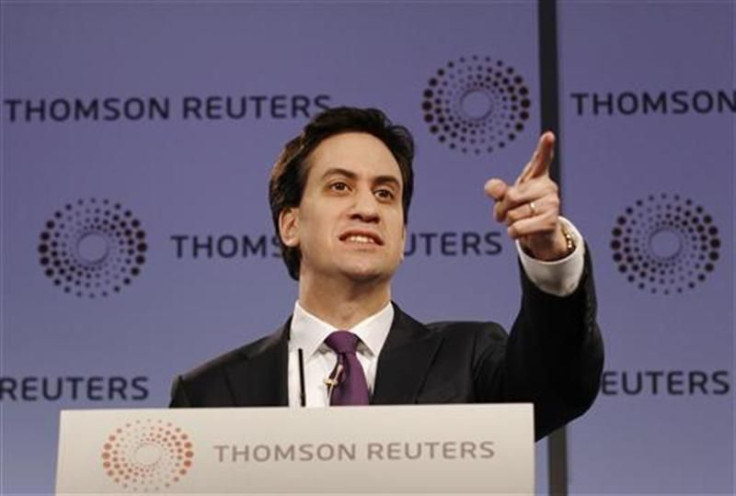Could Ed Miliband Become Britain’s First Jewish Prime Minister? Not Exactly

Should Ed Miliband, the leader of the Labour Party, become prime minister in the 2015 elections, he would become the first Jewish leader in British history -- well, almost.
Benjamin Disraeli, who served as prime minister as a Conservative during two separate terms in the Victorian era [1868 and 1874-1880], was born to Jewish parents, but baptized as an Anglican as a 12-year old boy.
Despite his apparent devotion to Christianity, Disraeli could not escape anti-Semitism, his enemies – including editorial cartoonists -- frequently referred to his Jewish origins in the most unflattering terms.
In a famously contentious dialogue with the Irish Nationalist MP Daniel O’Connell, Disraeli declared: "Yes, I am a Jew, and when the [Irish] ancestors of the Right Honorable Gentleman [O’Connell] were brutal savages in an unknown island, mine were priests in the Temple of Solomon."
Since Disraeli, Britain has had literally hundreds of Jewish politicians, including many MPs from the Labour, Conservative and other parties. Such prominent Jews have included Keith Joseph, one of the principal backers of Margaret Thatcher; Baron Shinwell, who lived to be 101; Robert Maxwell, the media tycoon; Leon Brittan, a onetime Home secretary; Sir Malcolm Rifkind, who served as both the Defense secretary and Foreign secretary in the 1990s; and Michael Howard, a onetime leader of the Conservative Party. But no one made it all the way to Number 10 Downing Street.
Now, more than 130 years after Disraeli’s death, Britain may again soon anoint a Jewish prime minister. Miliband, however, would not seem to have the most sterling qualities associated with traditional Judaism – he was raised by Polish Holocaust refugees who embraced Marxism and espoused atheism; he did not celebrate a bar mitzvah when he turned 13, nor is he married to a Jewish woman. He also told BBC that he doesn’t believe in God.
Jews who worried about the extent of his sympathies for Israel -- given that, among other things, he has criticized Jewish settlements on the West Bank as well as the blockade of Gaza – were put somewhat at ease when Miliband recently declared himself a strong supporter of Israel.
[Ironically, the last two British Labour prime ministers, Tony Blair and Gordon Brown (neither of whom is Jewish), were such strong supporters of Israel that British Jews were completely comfortable with them long before either entered Number 10.]
In an article published in the New Statesman last year, Miliband wrote: “I am not religious. But I am Jewish. My relationship with my Jewishness is complex. But whose isn’t? My family history often feels distant and far away. Yet the pain of this history is such that I feel a duty to remember, understand and discuss it -- a duty that grows, rather than diminishes, over time."
However, the Haaretz newspaper of Israel reported in March 2013 that while Miliband often disagrees with the Israeli government, he remains “intolerant of those who question Israel's right to exist.” During a public event in London which was organized by the Board of Deputies of British Jews and the London Jewish News, Miliband admitted that religion played no role in his upbringing, but that he was deeply committed to protecting Israel. "I have huge respect, admiration and indeed a debt, not just to Britain, but to Israel for the sanctuary it gave my grandmother – Israel gave her comfort," he told the gathering.
Miliband also expressed his support for the continuation of ancient Jewish religious customs, including circumcision. “Yes, these are important traditions,” he said. “The kosher issue has recently been brought to my attention. Ways of life must be preserved.”
Miliband also distanced himself from many members of his own Labour Party, including trade unions, who have expressed highly inflammatory opinions about Israel, including those who have called for a boycott of Israeli imports. "Yes, I consider myself a supporter of Israel,” he stated, although he fell short of describing himself as a Zionist. “I think it’s very, very important that as somebody who supports not only Israel’s right to exist but has huge respect for what Israel does that I count myself in that category,” he added. “But it doesn’t mean that I’m not critical of the government of Israel, and I think there’s a distinction, and I think it’s very, very important that we are able to make that distinction.”
The current prime minister, Conservative David Cameron, explicitly declared himself to be a Zionist during a lunch with Jewish donors in 2008. “If by Zionist you mean that the Jews have the right to a homeland in Israel and the right to a country then, yes, I am a Zionist,” Cameron said at the time.
Miliband also supports a two-state solution for Israel and Palestine and insisted that Britain (should he head the next government in London) could become an “honest broker” for the peace process.
© Copyright IBTimes 2024. All rights reserved.





















